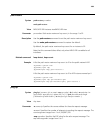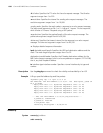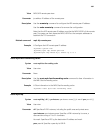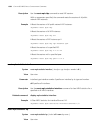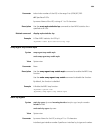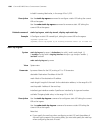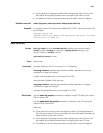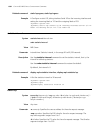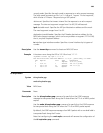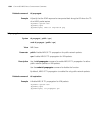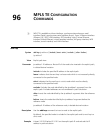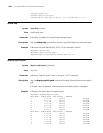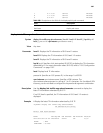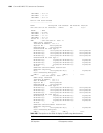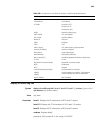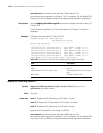
1563
-r reply-mode: Specifies the reply mode in response to an echo request message.
The reply-mode argument can be 1 or 2. A value of 1 means “Do not response”,
while a value of 2 means “Respond using a UDP packet”.
-t time-out: Specifies the timeout interval for the response to an echo request
message. The time-out argument ranges from 0 to 65,535 milliseconds.
ipv4 dest-addr mask: Specifies the LDP Ipv4 destination address and the mask.
The mask argument ranges from 0 to 32.
destination-ip-addr-header: Specifies the IP header destination address for the
MPLS echo request message, which can be any address on segment 127.0.0.0/8,
that is, any local loopback address.
te interface-type interface-number: Specifies a tunnel interface by its type and
number.
Description Use the
tracert lsp command to locate an MPLS LSP error.
Example # Locate an error along the LSP to 3.3.3.9 on host 1.1.1.1.
<Sysname> tracert lsp ipv4 3.3.3.9 32
LSP Trace Route FEC: LDP IPV4 PREFIX 3.3.3.9/32 , press CTRL_C to break.
TTL Replier Time Type Downstream
0 Ingress 10.4.5.1/[1025]
1 10.4.5.1 1 Transit 100.3.4.1/[1024]
2 100.1.4.2 63 Transit 100.1.2.1/[3]
3 100.1.2.1 129 Egress
ttl expiration
Syntax ttl expiration pop
undo ttl expiration pop
View MPLS view
Parameter None
Description Use the
ttl expiration pop command to specify that the ICMP response
message be transported back along the IP route when the TTL of an MPLS packet
expires.
Use the
undo ttl expiration pop command to specify that the ICMP response
be transported back along the LSP when the TTL of an MPLS packet expires.
By default, the ICMP response message of an MPLS packet with a one-level label is
transported back along the IP route.
Note that configuring the undo mpls command will remove the configuration of
the ttl expiration pop command.



